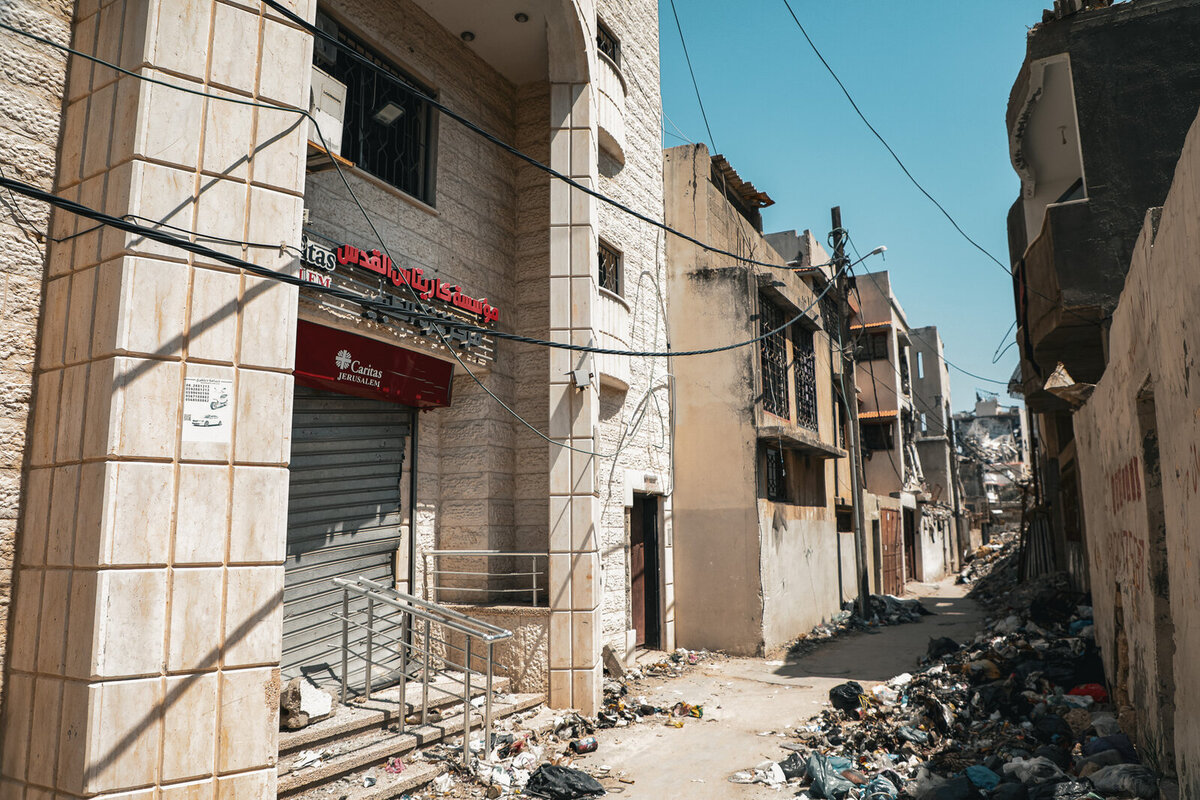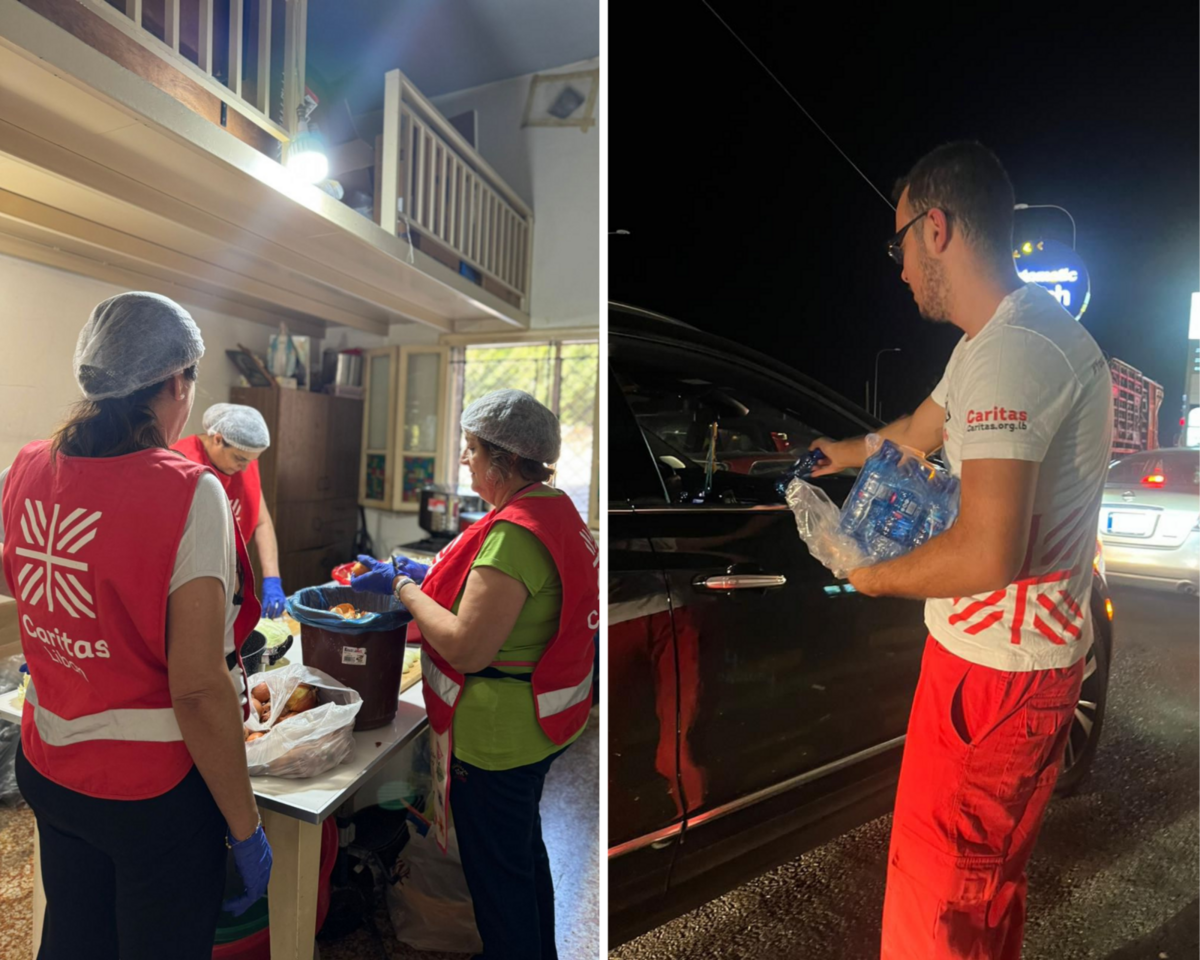7th October marks exactly one year since the Hamas attack on Israel, which escalated into the current war in the Gaza Strip and has had a profound impact on events across the region. After twelve months of relentless bombing, the Gaza Strip is completely devastated. More than 42 000 Palestinians have lost their lives and more than 99 000 others have been injured. People are also dying in the West Bank and, following the recent escalation, in Lebanon. Caritas has been helping since the beginning of the conflict.
DONATE TO HELP CIVILIANS IN GAZA
A year of utter destruction
More than 2 million Palestinians lack access to the basic necessities of life, such as food, water, sanitation, as well as safe shelter and health care. Families are repeatedly forced to leave their homes and move from one dangerous place to another without being able to escape. In addition, local children are unable to attend school and therefore continue to receive no education.
Famine continues to threaten Gaza, with all 2.1 million residents still in urgent need of food aid. Humanitarian access remains limited, with aid difficult to reach Gaza due to active fighting.
Behind the high casualty figures in the Gaza war are human stories. Like the story of our colleague from Caritas Jerusalem, which has been helping in Gaza for a long time.
"We hoped that the war would end soon. Unfortunately, it took increasingly dramatic turns. For me personally, in December last year, the house we were in was attacked by Israeli rockets in the early hours of the morning," says Ahmad Al-Daya from Caritas Jerusalem in Gaza. "Suddenly I didn't hear, see or feel anything. I woke up under the rubble of the house," says Ahmad, who has had to move several times since then within Gaza. Every Gazan experiences similar stories. For no place in Gaza is safe.
The Gaza Strip also remains home to 101 hostages who were kidnapped by Hamas on 7th of October. Caritas has repeatedly called for a ceasefire, respect for humanitarian law and the release of all hostages and arbitrarily arrested prisoners.
Attacks on health facilities and humanitarian workers
Humanitarian organisations are struggling to deliver aid in Gaza and the West Bank despite obstacles and at great personal risk. A huge number of aid workers have already died in Gaza, including two employees of the local Caritas. Our colleague Viola from Caritas Jerusalem, her children and husband also lost their lives in the air strike on St Porphyrios Church. Caritas Czech Republic is trying to support her mother, who lost both her daughter and three grandchildren. Although what we are able to offer her will never make up for such a great loss.
Humanitarian organisations also report daily attacks on medical facilities and the blocking of ambulances, both in the Gaza Strip and in the West Bank. There have been more than a thousand attacks on health facilities since the conflict began to escalate.
Following attacks on medical facilities, only 17 of the 36 hospitals in Gaza are at least partially operational. There is a shortage of fuel for generators to run intensive and specialised care, medicines and other medical supplies. Many medical staff have lost their lives or been forced to flee, while the remaining staff face extreme overload. At the same time, the entire population is facing a sharp increase in injuries and illnesses. Particularly worrying is the first case of polio in more than 25 years.
The impact on the West Bank
The war is also significantly affecting the West Bank region. Since 7th October, more than 700 Palestinians have been killed and more than 6 000 injured. "People are dying not only in Gaza but also in the West Bank. Locals are suffering from a lack of food, water and safe shelter," says Kateřina Velíšková from Caritas Czech Republic, who recently visited the region. According to Velíšková, the impact of the war in Gaza on the West Bank is enormous.
Immediately after the Hamas attack on civilians, the Israeli government announced the suspension of work permits for nearly 150,000 Palestinians from the West Bank. This has left many of them without jobs and with no other means of livelihood. Unemployment in the West Bank has risen to 32% as a result of the Gaza war. Those who have kept their jobs often work part-time or have had their wages cut significantly.
"Because of the war, tourists who used to come in their hundreds of thousands have stopped coming. This shortfall has affected towns like Bethlehem, which depended mainly on tourism. Many shops had to close, people lost their source of income and the situation in the West Bank is even worse," says Katerina Velíšková.
Caritas provides necessary health care and basic humanitarian aid
Caritas has been helping since the beginning of the escalation of the conflict in the Gaza Strip, despite the dire conditions. Our partner organisation Caritas Jerusalem provides primary health care directly in Gaza. It currently has 94 staff in Gaza, mainly doctors, nurses or pharmacists, who are divided into 12 medical teams, 11 of which provide assistance in central Gaza, where most of the displaced people are located. One of the teams remains in Gaza City, where the original main centre of Caritas Jerusalem, which has long been active in the area before the escalation of the current conflict, was located. The central health centre was damaged as a result of the war, but our colleagues are trying to rebuild it.
In addition to providing health care in makeshift conditions, our colleagues at Caritas Jerusalem are also helping to provide basic humanitarian needs. Caritas also provides important psychosocial assistance.
In cooperation with Caritas Jerusalem, Caritas Czech Republic is providing medical care for 5,000 local residents. This is another mutual cooperation to help the affected civilians. The provision of medical aid in Gaza is financially supported by the Ministry of Foreign Affairs of the Czech Republic.
Caritas is also actively involved in helping civilians in the West Bank. Our partner organisation, Caritas Jerusalem, is helping in 30 villages and the Jenin refugee camp. In collaboration with Catholic Relief Services, they provide basic humanitarian and medical assistance, including psychosocial support.
Caritas has also contributed to the repair of destroyed shelters and provided financial support to people affected by the conflict to enable them to acquire basic necessities. Farmers who have lost access to land due to land grabbing have also received assistance.
Local NGOs in Bethlehem employing people with special needs also received support. Bethlehem, which is heavily dependent on tourism, lost a large number of visitors as a result of the war, making it difficult for many residents to make a living. Caritas therefore helps the most vulnerable among them.
Escalation in Lebanon
The war in Gaza is having a major impact on events across the Middle East region, particularly in Lebanon in recent days. Hezbollah and Israel have clashed almost daily in cross-border firefights since 7th October last year, when Hamas attacked Israel. At the end of September this year, the Israeli army stepped up its operations against Lebanon, announcing a 'limited' ground operation against Hezbollah and launching an invasion of Lebanon on the night of Monday 30th September to Tuesday 1st October. Israel launched further air strikes on the southern suburbs of Beirut and bombed several neighbourhoods after ordering residents to evacuate. At least 95 people died in Monday's attacks, according to the Lebanese health ministry.
Israeli attacks on Lebanon have displaced up to 1 million residents from their homes. More than 130,000 have fled to Syria.
Caritas is also actively helping on the ground. The local Caritas Lebanon has been tirelessly supporting the displaced residents, providing them with drinking water, hot food, hygiene items, mattresses, blankets and medical care.
Caritas Czech Republic has financially supported partner organisation Caritas Lebanon in providing care to the people affected by the escalation of the conflict.
We wish for the war to end soon
"We hope that the war, the suffering and the displacement will end soon so that we can return to our homes, neighbourhoods and streets as we used to know them. I wish that we can return to our former life, which was also not normal, but was still better than the life we are living today," says our colleague Ahmad Al-Daya from Caritas Jerusalem, who works in Gaza.
Caritas Czech Republic has long called for an immediate ceasefire, the release of all hostages and the provision of adequate humanitarian aid.
Thank you for helping with us.
DONATE TO HELP CIVILIANS IN GAZA














